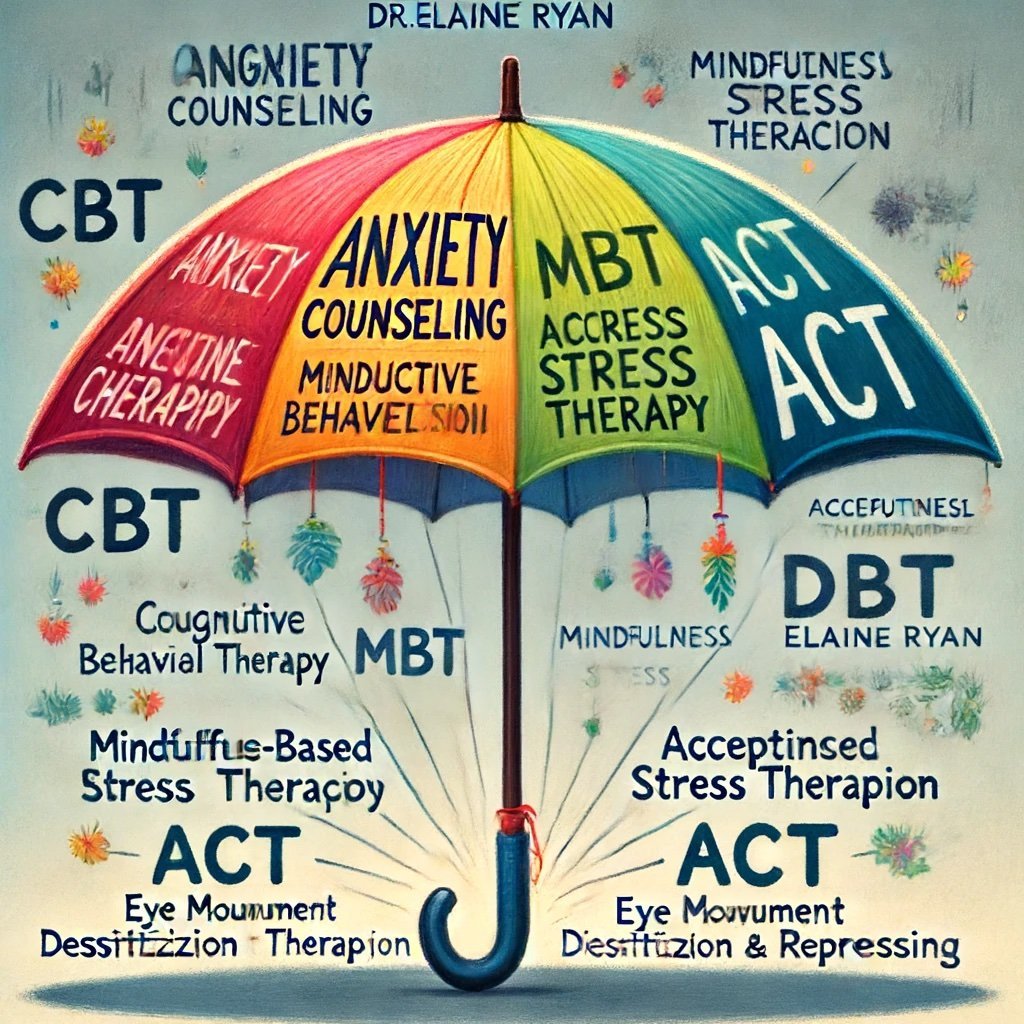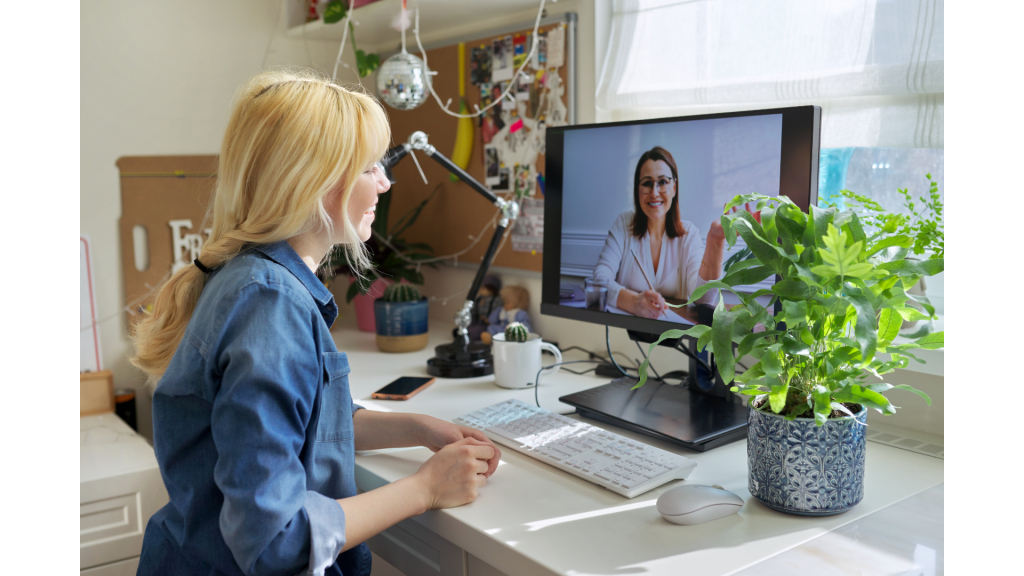About the author
Page last updated by Dr Elaine Ryan


Anxiety counselling refers to the talking therapies that specifically help with anxiety. It is important to know this is an umbrella term for specific therapies such as cognitive behavioural therapy (CBT). If your GP has diagnosed you with anxiety, they have probably already spoken to you about counselling, and while seeking professional help is crucial in overcoming anxiety, the term is so broad that I decided to write this article to explain what anxiety counselling entails, what the benefits are and what models of therapy fall under this wide umbrella.
If you attend counselling with me ( a psychologist) or someone like myself, I will be able to offer several models of therapy that have been shown to be effective with anxiety. All psychologists will be able to offer this, as we are all trained in many reputable models of therapy but may specialise in different areas; for example, I specialise in anxiety disorders and OCD. The choice comes down to getting a good fit for you as a person, and the remainder of the article will help you do that.
Retrain Your Brain®


Dr Ryan’s online self-help course for anxiety
Understanding Anxiety and Its Impact
Anxiety is more than just feeling stressed or worried. It’s a persistent feeling of unease, such as fear or worry, that can be mild or severe. I won’t go into detail explaining the concept of anxiety as I have written an extensive guide to anxiety that you can read here.
Everyone experiences anxiety at some point. However, for some individuals, anxiety can become chronic, affecting their daily life, health, and well-being. If this sounds like you, you might have noticed that it can interfere with your ability to work or go to college. You probably also have noticed an array of physical symptoms that you didn’t have before, and it is important that you get your doctor to rule out physical conditions before seeking treatment for anxiety. Understanding anxiety and its impact is the first step towards managing it. Recognizing the signs and symptoms can help you seek professional help when needed.
Common Symptoms of Anxiety Disorders
Anxiety disorders manifest in various ways. However, there are common symptoms that individuals may experience.
These symptoms can be grouped into psychological and physical categories. Psychological symptoms include persistent worry, fear, irritability, and difficulty concentrating.
Physical symptoms may include fatigue, headaches, muscle tension, and sleep disturbances. It’s important to note that these symptoms can vary in intensity and frequency.
Recognizing these symptoms can be crucial in seeking timely professional help. It’s important to remember that everyone’s experience with anxiety is unique.
Read a more detailed explanation of the symptoms of anxiety
Prevalence of anxiety
In Ireland, anxiety disorders affect a significant portion of the population. According to recent surveys, about 74% of Irish adults report experiencing anxiety at some point in their lives. This high prevalence highlights the widespread nature of anxiety disorders in the country, affecting both men and women, with women and younger individuals being particularly susceptible. The data shows that almost half of those experiencing anxiety report frequent symptoms, indicating a substantial impact on daily functioning for many individuals. Anxiety rates are notably higher among women (82%) compared to men (67%), and those under the age of 44 are more affected (86%) compared to older age groups? (Mental Health Ireland)??(Aware)?.
If you are one of those people currently struggling with anxiety and are thinking about counselling, I shall talk about that now.
The Role of Anxiety Counselling
Anxiety counselling plays a crucial role in managing and overcoming anxiety disorders. It provides a safe space for individuals to express their feelings and fears.
Counselling can help you understand the root cause of your anxiety as well as teach you strategies to manage your symptoms effectively.
A psychologist, like myself or other therapists, guides you through this process using evidence-based therapeutic approaches tailored to your individual’s needs.
Finding a Qualified Anxiety Counsellor in Dublin
Finding a qualified anxiety counsellor is a crucial step in managing anxiety. In Dublin, there are numerous professionals offering this service.
It’s important to find a counsellor who you feel comfortable with. They should be someone who understands your needs and can provide the necessary support.
They also need to be trained in the therapies that have been shown to be effective with anxiety, as not all approaches are helpful. I’ll talk about the approaches now.
Evidence-Based Therapeutic Approaches
Evidence-based therapeutic approaches are central to effective anxiety counselling. These approaches are backed by scientific research and have been proven to help individuals manage their anxiety symptoms. This is important for you to know as if you are about to invest in counselling, you need to make sure that the approach you use has been researched and shown to help. Often people at the start of their search for counselling are unaware of the importance of evidence based approaches which is why I highlight it here.
Cognitive Behavioral Therapy (CBT) and Exposure Therapy
Cognitive Behavioral Therapy (CBT) is a widely used therapeutic approach in anxiety counselling. It focuses on the relationship between thoughts, feelings, and behaviours.
CBT helps individuals understand how their thoughts influence their feelings and behaviours. It equips them with strategies to challenge and change their negative thought patterns.
Exposure therapy, on the other hand, involves gradual and repeated exposure to the source of anxiety. This helps individuals reduce their fear response over time. It can be particularly effective for individuals with specific phobias or social anxiety.
Mindfulness-Based Stress Reduction MBSR
MBSR may not be as well known as other models, such as CBT, but it is a good model nonetheless to help you with anxiety, and I have written a more detailed account of how it can help with anxiety here.
Personalized Treatment Plans and Their Importance
Personalized treatment plans are crucial in anxiety counselling. They ensure that the therapeutic approach aligns with the individual’s unique needs and goals.
A personalized treatment plan takes into account the individual’s symptoms, triggers, and coping mechanisms. It also considers their personal history and life circumstances.
This personalized approach increases the likelihood of successful treatment. It ensures that individuals receive the most appropriate and effective care for their specific anxiety disorder.
Managing Anxiety Outside Counselling Sessions
Counselling is not just about the time you spend with your therapist once a week. It is equally important what you do outside your counselling sessions, as this is still ‘treatment time.’ Depending on how your therapist works, you could have been set homework, anyone who attends counselling with myself is set homework each week, especially if we are using CBT.
How you look after yourself between sessions is also important. This includes maintaining a healthy lifestyle, practicing relaxation techniques (which will have been taught in session.)
Self-Care Strategies and Lifestyle Changes
Activities like journaling, mindfulness, and spending time in nature can enhance mental and emotional well-being. These activities can help reduce anxiety and improve overall mood.
Here are some self-care strategies to consider:
- Regular exercise
- Balanced diet
- Adequate sleep
- Journaling
- Mindfulness
- Spending time in nature
Relaxation Techniques and Stress Reduction
Relaxation techniques can be highly effective in reducing anxiety. They help calm the mind and relax the body, reducing the physical symptoms of anxiety. You can read more about guided relaxation in this article.
One popular relaxation technique is deep breathing. This involves taking slow, deep breaths and focusing on the breath. This can help reduce feelings of panic and anxiety.
Another effective technique is progressive muscle relaxation. This involves tensing and then relaxing each muscle group in the body. This can help reduce physical tension and promote relaxation.
Overcoming Challenges and Measuring Progress
In the 20 years I have been working as a psychologist, I find that people focus more on what is not working than what is. It is important therefore that you learn to measure your progress effectively as it will motivate you to keep going if you see you are making positive change. We do this formally in session by using psychological tests, but you can also focus on celebrating your wins, no matter how small and learn how to deal with setbacks without turning them into a big deal.
Dealing with Setbacks and Maintaining Motivation
Setbacks are a common part of the journey to overcoming anxiety. They can be frustrating and disheartening, but it’s important to view them as opportunities for learning and growth.
Maintaining motivation during these challenging times can be difficult. It’s important to remember why you started this journey and to celebrate the progress you’ve made so far. This can help keep you motivated and committed to your recovery.
Setting Realistic Goals and Celebrating Victories
Setting realistic goals is a crucial part of anxiety counselling. These goals should be specific, measurable, achievable, relevant, and time-bound (SMART).
Celebrating victories, no matter how small, is equally important. This can boost motivation, increase self-esteem, and reinforce positive behaviors. Remember, every step forward, no matter how small, is a victory worth celebrating.
Resources for anxiety
If you are not yet ready for counselling, the following are useful resources.
1. Mental Health Ireland
Mental Health Ireland offers a variety of resources, including information on anxiety, self-help tools, and links to professional services. They provide educational materials and support programs aimed at improving mental health awareness and resilience.
- Website: Mental Health Ireland
2. Aware
Aware is an organization focused on supporting individuals affected by depression and anxiety. They offer support groups, educational programs, and an array of resources tailored to help manage anxiety.
- Website: Aware
3. HSE Mental Health Services
The Health Service Executive (HSE) in Ireland provides comprehensive mental health services, including resources for managing anxiety. They offer guidelines, support services, and information on accessing mental health professionals.
- Website: HSE Mental Health Services
4. SpunOut.ie
SpunOut.ie is a youth-focused website providing mental health resources, including articles on managing anxiety, stress, and other mental health issues. They offer practical advice and peer support.
- Website: SpunOut.ie
5. Mindfulness Ireland
Mindfulness Ireland promotes mindfulness practices that can help reduce anxiety and improve overall mental well-being. They provide resources, workshops, and information on mindfulness techniques.
- Website: Mindfulness Ireland
6. Jigsaw
Jigsaw is a national center for youth mental health in Ireland, offering resources, advice, and support for young people experiencing anxiety and other mental health issues.
- Website: Jigsaw
7. Anxiety Ireland
Anxiety Ireland is dedicated to helping individuals manage and overcome anxiety disorders. They provide information, support, and access to professional counselling services.
- Website: Anxiety Ireland
8. Samaritans Ireland
Samaritans provide 24/7 support for anyone experiencing emotional distress, including anxiety. They offer a listening ear and can guide individuals towards further help and resources.
- Website: Samaritans Ireland
9. Calm App
The Calm app offers guided meditations, sleep stories, and relaxation techniques specifically designed to reduce anxiety and improve mental health.
- Website: Calm App
10. Headspace
Headspace provides mindfulness and meditation exercises to help manage anxiety. They offer a range of guided sessions tailored to various levels of experience.
- Website: Headspace
These resources provide a wealth of information and support for those experiencing anxiety, offering both professional guidance and self-help tools. If you’re struggling with anxiety, exploring these options can be a great first step towards managing your mental health effectively.
